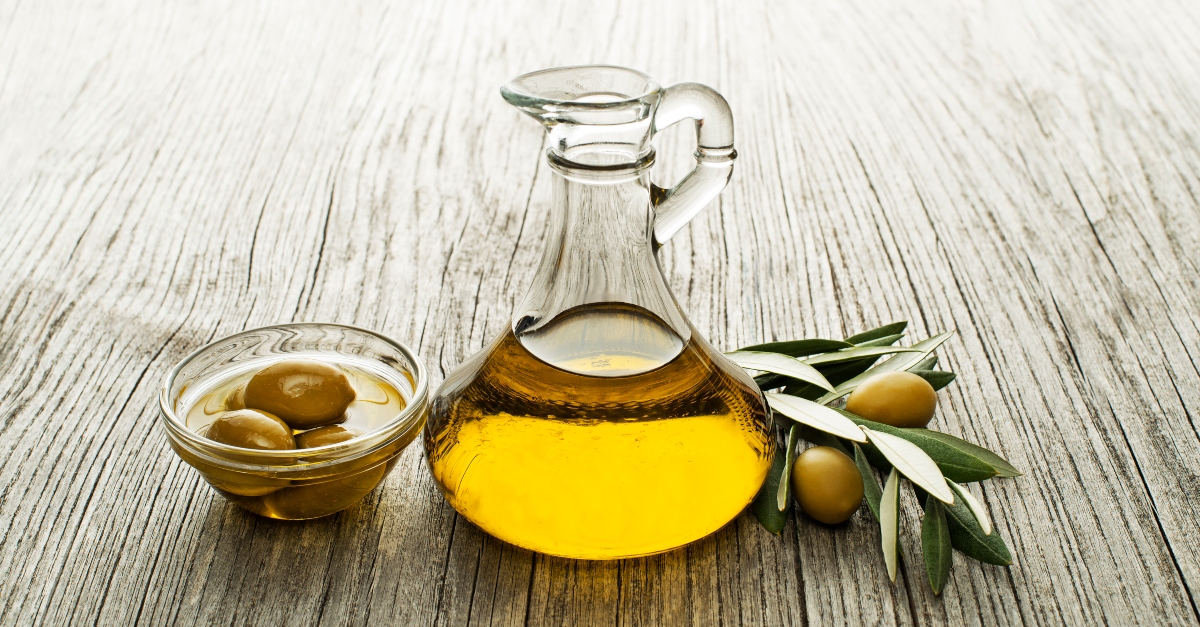
Frequently, especially in the Old Testament, we see anointing of oil as an important practice in the Bible. In fact, one of the most quoted chapters of Scripture, Psalm 23, includes the phrase, “You anointed my head with oil.”
Often certain symbolic elements in the Bible have become lost in our culture today, because we no longer have the same customs or practices.
Why does pouring oil over someone’s head have a symbolic importance in the Old Testament? Do we see this practice in other ancient cultures? And should we anoint with oil today?
Photo credit: ©Getty Images/dulezidar
Anointing Oil Symbolism in the Old Testament - "Holy and Set Apart"

It seems, at first glance at the Old Testament Bible books, that olive oil, or anointing oil, had predominantly a religious purpose to symobolize someone or something that has been deemed holy and set apart for God's purposes.
Not only would you pour oil on the head of a high priest, but also this “holy” oil would sprinkle on furnishings in the Tabernacle (Exodus 25:6), a transportable temple for God’s people, until they created a permanent place of worship during the time of Solomon.
Oil in the biblical context held significant sanctifying (cleansing) properties. When someone poured oil on a person or an object, it symbolized setting apart that person or object as holy and dedicated to the Lord. This act of anointing indicated that the anointed was consecrated, marked by divine favor, and chosen for a special purpose or mission.
Throughout the Old Testament, the practice of anointing extended to both people and inanimate objects. For instance, in Genesis 28:18, Jacob anointed a stone pillar, dedicating it as a sacred place after his vision of the ladder reaching to heaven. This ritual signified the stone as a blessed object, marking it as a tangible representation of God's presence and promise.
Anointing was also a common practice in the appointment of kings. The anointing of a king was a profound and public declaration that the individual was chosen by God to lead and govern His people. This is vividly illustrated in the story of Samuel anointing David. When Samuel, following God's command, anointed the youngest son of Jesse, it was not a mere ceremonial gesture but a divine proclamation. The family, witnessing Samuel's action, would have immediately recognized its significance. They understood that the anointing was not just an oil bath but a divine endorsement and empowerment.
This event was particularly surprising because David was the youngest and seemingly least likely candidate among Jesse's sons. Yet, God’s choice emphasized that His criteria for leadership went beyond human expectations and appearances. As 1 Samuel 16:7 states, "The Lord does not look at the things people look at. People look at the outward appearance, but the Lord looks at the heart." Thus, Samuel's anointing of David was a clear indication that God had chosen him to be the next king of Israel, reflecting God's sovereign will and the sacred nature of the anointing process.
Additional in the Old Testament, olive oil also was used during the beautification process in Esther 2:12.
Over the span of several months, Esther, along with other eligible ladies, would cleanse themselves with myrrh and oil for six months (and another six months with perfume and cosmetics).
As stated in this International Standard Bible Encyclopedia, oil often signified prosperity, blessings, and stability, opposed to other periods throughout Israel’s history where the harvest was not bountiful and famine had swept the land (Joel 1:10).
credit: ©Getty Images/Zdenek Sasek
Oil Symbolism in the New Testament - Healing

The practice of anointing with oil carries over into the New Testament, taking on significant meaning in the context of Christian life and ministry. Jesus Himself refers to the use of oil in several instances, highlighting its continued importance.
In Matthew 6:17, Jesus instructs His followers, "But when you fast, anoint your head and wash your face." Here, anointing with oil is part of the personal discipline of fasting, a practice intended to keep the act private and sincere before God, rather than a public display of piety.
Moreover, Mark 6:13 describes how Jesus' disciples "drove out many demons and anointed many sick people with oil and healed them." This verse clearly illustrates that anointing with oil was part of the healing ministry of Jesus' followers, signifying not only a physical act of care but also a spiritual one, invoking God's power and blessing for healing.
The practice of anointing with oil extends beyond the Gospels and is further endorsed in the New Testament, most notably in the Epistle of James. James 5:14-15 says, "Is anyone among you sick? Let them call the elders of the church to pray over them and anoint them with oil in the name of the Lord. And the prayer offered in faith will make the sick person well; the Lord will raise them up." This passage provides a clear directive for the early church, associating the anointing with oil with prayer and faith, and emphasizing its role in the healing process.
Despite these references, the use of anointing oil is less prevalent in other New Testament writings, leading to some debate among Christians regarding its relevance and application today. Some believers view anointing with oil as a symbolic act that continues to hold spiritual significance, while others may see it as a cultural practice specific to the early church.
Regardless of one’s position on the practice of anointing with oil, it is essential to approach differing viewpoints with gentleness and respect. In Romans 14:1-4, Paul encourages believers to accept those with differing opinions on disputable matters without passing judgment, fostering unity and mutual respect within the Christian community.
In conclusion, while the practice of anointing with oil is firmly rooted in the New Testament and carries spiritual significance, its application today varies among different Christian traditions. Whether one chooses to continue this practice or not, it remains a symbol of faith, healing, and dedication to God, reminding believers of the importance of compassion, prayer, and unity in their spiritual journey.
Photo credit: Unsplash/Aaron Burden
Additional Usage of Oil in the Bible

We should note that oil has symbolism beyond anointing in the Bible. The Israelites used oil for several purposes in the Old and New Testament.
Symbolism and Uses of Oil
Lighting Lamps: One of the practical uses of oil was for lighting lamps, as illustrated in Matthew 25. In the Parable of the Ten Virgins, oil lamps symbolize preparedness and readiness for the bridegroom’s arrival, underscoring the importance of spiritual vigilance.
Lotion for Skin and Hair: Oil was also used as a lotion for skin and hair, providing nourishment and protection. In the harsh climates of the ancient Near East, oil served as a practical means of preserving skin and hair health.
Medicinal Properties: Recognizing the medicinal properties of oil, people used it for healing and soothing wounds. Isaiah 1:6 references oil's use in treating wounds, indicating its therapeutic benefits.
Spiritual Symbolism of Oil
Holy Spirit’s Presence: The symbolic link between oil and the Holy Spirit is profound. In the Old Testament, anointing with oil often signified the Holy Spirit’s presence and empowerment. For example, when David was anointed by Samuel in 1 Samuel 16:13, the Spirit of the Lord came powerfully upon him from that day forward. This connection emphasizes that anointing is not merely a physical act but a spiritual one, invoking divine presence and blessing.
Anointing in the New Testament
Jesus as the Anointed One: The term "Christ" means "the Anointed One," signifying that Jesus is anointed by the Holy Spirit. This title highlights Jesus’ divine mission and the presence of the Holy Spirit in His ministry, fulfilling Old Testament prophecies and expectations.
Consecration and Sanctification: Anointing with oil in the Bible symbolizes setting apart something or someone for God’s use. This act of consecration and sanctification indicates dedication to divine service and recognition of God’s sovereignty over the anointed.
Other Uses of Oil
Anointing Corpses: Oil was used to anoint corpses, as seen in Mark 16:1, where the women brought spices and oil to anoint Jesus’ body. This practice showed respect and care for the deceased, preparing them for burial.
Refreshing Bodies: Oil was used to refresh and rejuvenate the body, providing comfort and relief. In Luke 7:46, Jesus mentions that His host did not anoint His head with oil, a common courtesy and sign of hospitality in that culture.
Photo credit: ©Getty Images/dulezidar
Should Christians Use Anointing Oil Today?

Whether we believe Christians should still practice the anointing of oil today, this subject matters for a number of reasons.
God used an important cultural symbol and practice to foreshadow the work of the Holy Spirit. Although the Israelites consecrated priests and holy objects, setting them apart for God’s work, that was only the beginning.
The Holy Spirit consecrates saints; He anoints them. He sets us apart to do the work of God.
We can also see God’s provision at work through the multiple uses of oil. In the same way, we can picture how God can use us in multiple ways. Sometimes He’ll ordain ordinary tasks such as our day-to-day tasks in the workplace.
In other instances, He’ll give us spiritual gifts to use to encourage other believers and present a light to unbelievers.
We see the importance of oil through the word “anointed” and its associations with Jesus. Anointing oil was used on priests and kings for important purposes. In the same way, Jesus is our High Priest and our King.
This practice used in Israel and throughout the Ancient World foreshadowed God’s work through his Son.
Photo credit: ©Getty Images/Anyaberkut